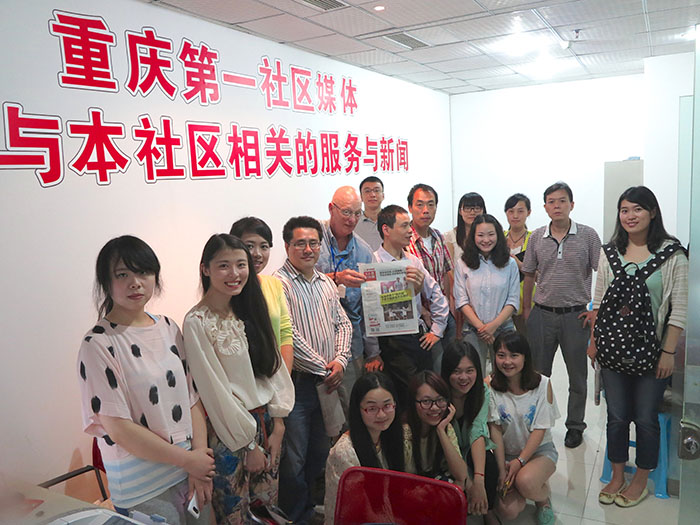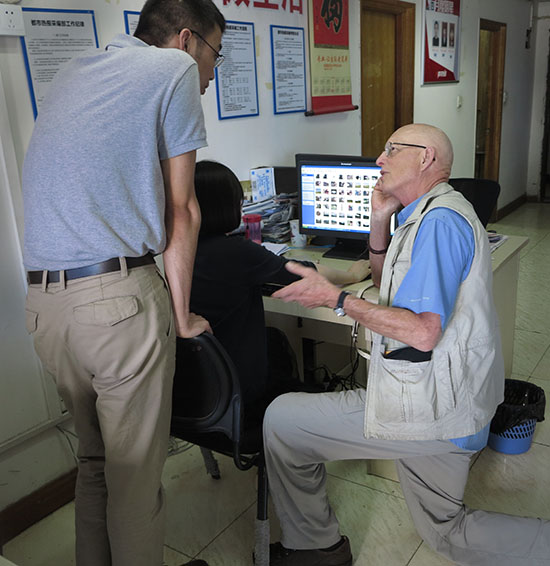
Chongqing, with its five competing big metro daily newspapers, reminds me of New York City in the 1920s.
Five big papers duking it out for every reader, for every advertiser. It’s an old-fashioned newspaper war. You’d think a city of 30 million people could support that many papers, but I’m told ad revenues last year fell precipitously.
Enter community journalism. Two of the major metro papers have launched smaller neighborhood community newspaper ventures this year. It’s a bold move, and from the surface they look promising.
But frankly, senior management downtown at the big papers views these new start-ups out in the hustings primarily as a new potential revenue stream, and not so much as a tool for civic engagement or improving life — or even a way to do better and more effective local journalism. It’s about the almighty dollar, or in this case, the yuan. Which, as a former community newspaper publisher, I can respect.
But if their only drive is the profit motive, they will not succeed, at least in the opinion of this ink-dabbler.
The irony, to me at least, is that the local government leaders, with whom the papers are partnering (and getting some financial support from) DO see these start-ups as community-building initiatives, and valued for their contributions to that elusive and long-sought after Chinese goal: “the harmonious society.”
And I believe the boots-on-the-ground newspaper staffers understand the greater social significance of so-called “hyper-local” reporting (a term of which I am not fond, but will use in this case to better make my point.)
This morning I am taken to a “Ju wei hui,” the smallest municipal unit, even smaller than a “street.” Here, in a stiflingly hot small newsroom packed with a dozen journalists, I meet the staff of the Da-shi-hua News” that serves a neighborhood of 168,000 souls. (That’s three-quarters the size of Durham!) Their publication is a 20,000-circulation, free, eight-page tabloid twice-weekly. And the content is all-local.
Launched just this past January, the Da Shi Hue News is, in part, a counter-punch by the Chongqing Evening News in response to the three community newspaper start-ups of their bitter cross-town rival, the Chongqing Morning News, who beat them to the punch last summer.
Sweat-drenched but happy to be among fellow journalists, I am led into a big conference room to meet the local governmental leaders and chat with the paper’s staff.
On the wall a projector shows a slide welcoming “Professor JOCC.”
First I hear from Jin Li, the neighborhood leader, a kind-eyed raven-haired man of my age, I’d guess, who runs the meeting with magisterial calm and a constant contented smile on his handsome face. I consider Mr. Jin to be an enlightened progressive politician; he has read Prof Chen Kai’s book on community journalism, and is clearly up to speed on the philosophical underpinnings. “We want to keep our people informed,” he tells me, “about what their local government is doing and what we plan to do.” And he adds, “We want to give the local residents a new life. And we are not worried about the finances (of the paper).”
When I asked about pre-publication restraint or censorship, Mr. Jin smiles serenely, thinks for a moment and says, while he did have the right of prior restraint, so far he hasn’t exercised that option. So far so good, he tells me. He trusts the editors and the staff not to blindside him.
Remember, I have to remind myself again, “this is China.” Back in the U.S., such a partnership would be considered “strange bedfellows” indeed!

So, what do the paper’s editors think about the partnership and the venture?
Editor Ding tells me that Mr. Jin “is an open-minded leader,” and that “the aim of the paper is to enhance the sense of union” in the neighborhood.
Deputy Chief Editor Fan Tian Ling says, “It’s a bridge between the people and the government, and we use it to solve problems.”
Like what? I ask — ever the reporter.
“We have a page for complaints,” I am told. Readers can send in anonymous gripes, which a reporter then tracks down and verifies, and if it passes the smell test, the paper runs the kvetch, sans signature.
Turns out people in Chongqing complain about potholes and lousy landlords, just like folks in Chapel Hill. And, not surprisingly, such public grousing in the paper gets things fixed, so I am told.
Editor Ling leans across the table and tells me proudly, “This newspaper is more than just a newspaper.”
Well, score one for the home team.
Now, if they can just sell enough advertising to keep the big boys downtown off their backs.

